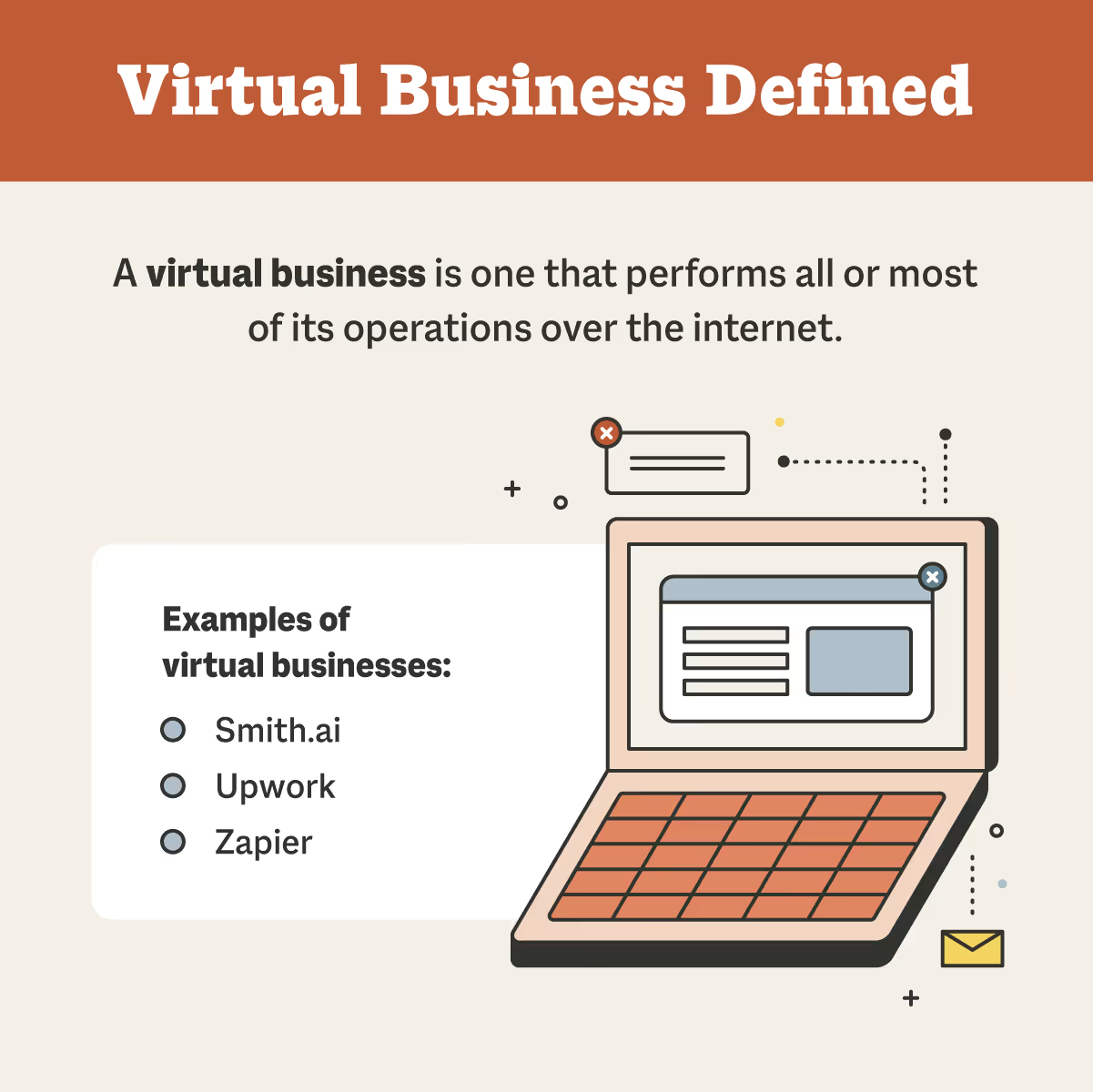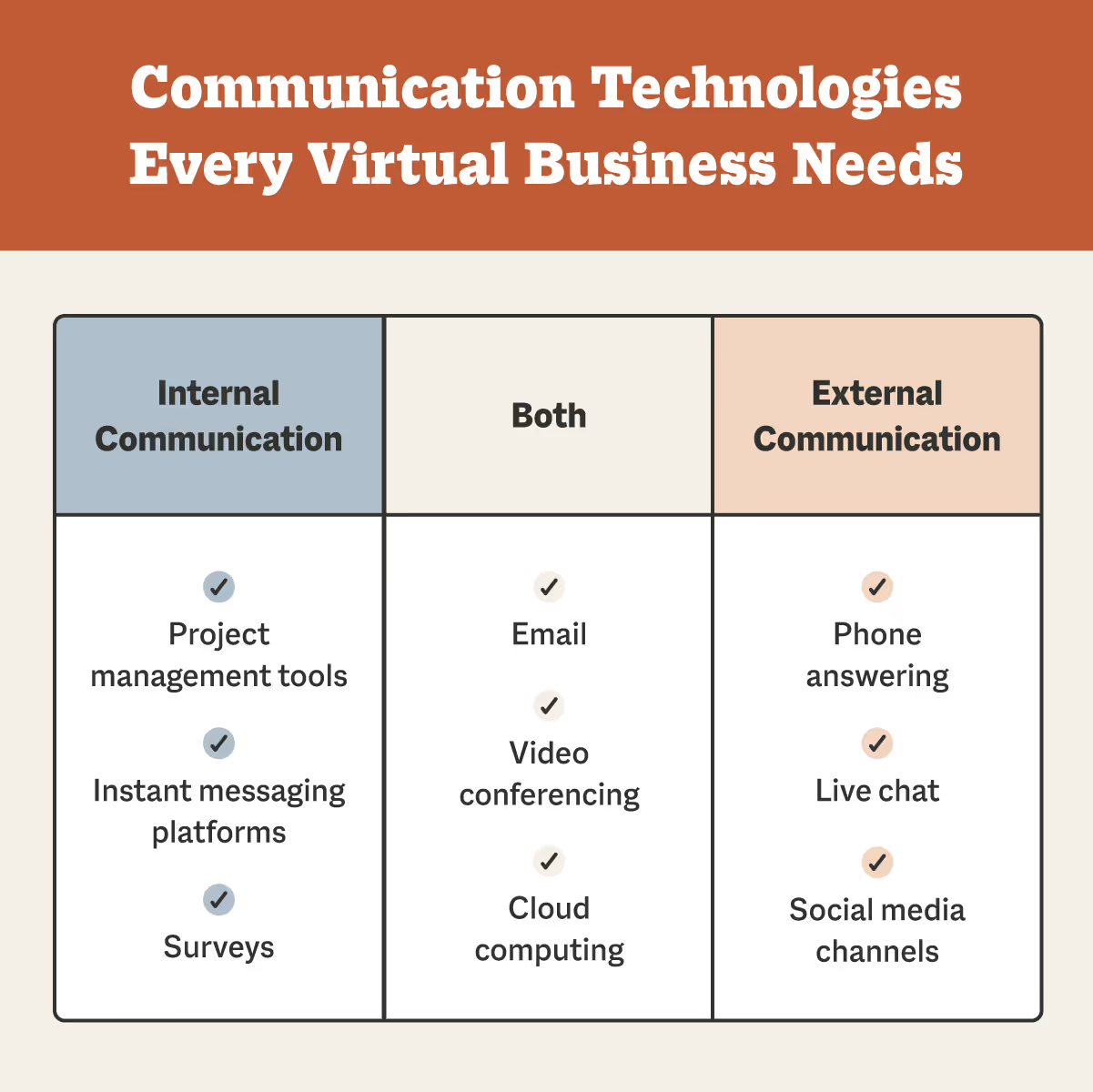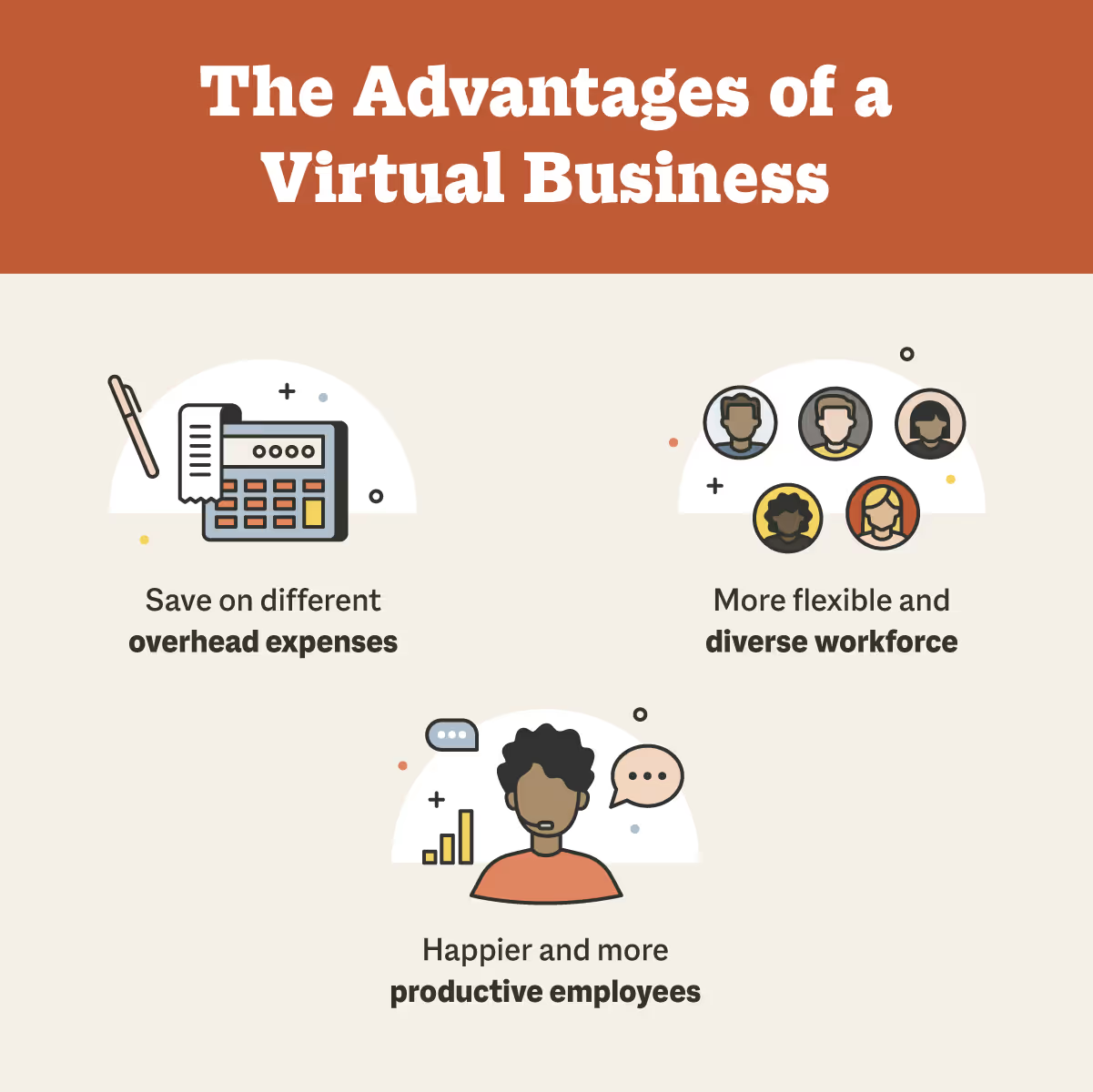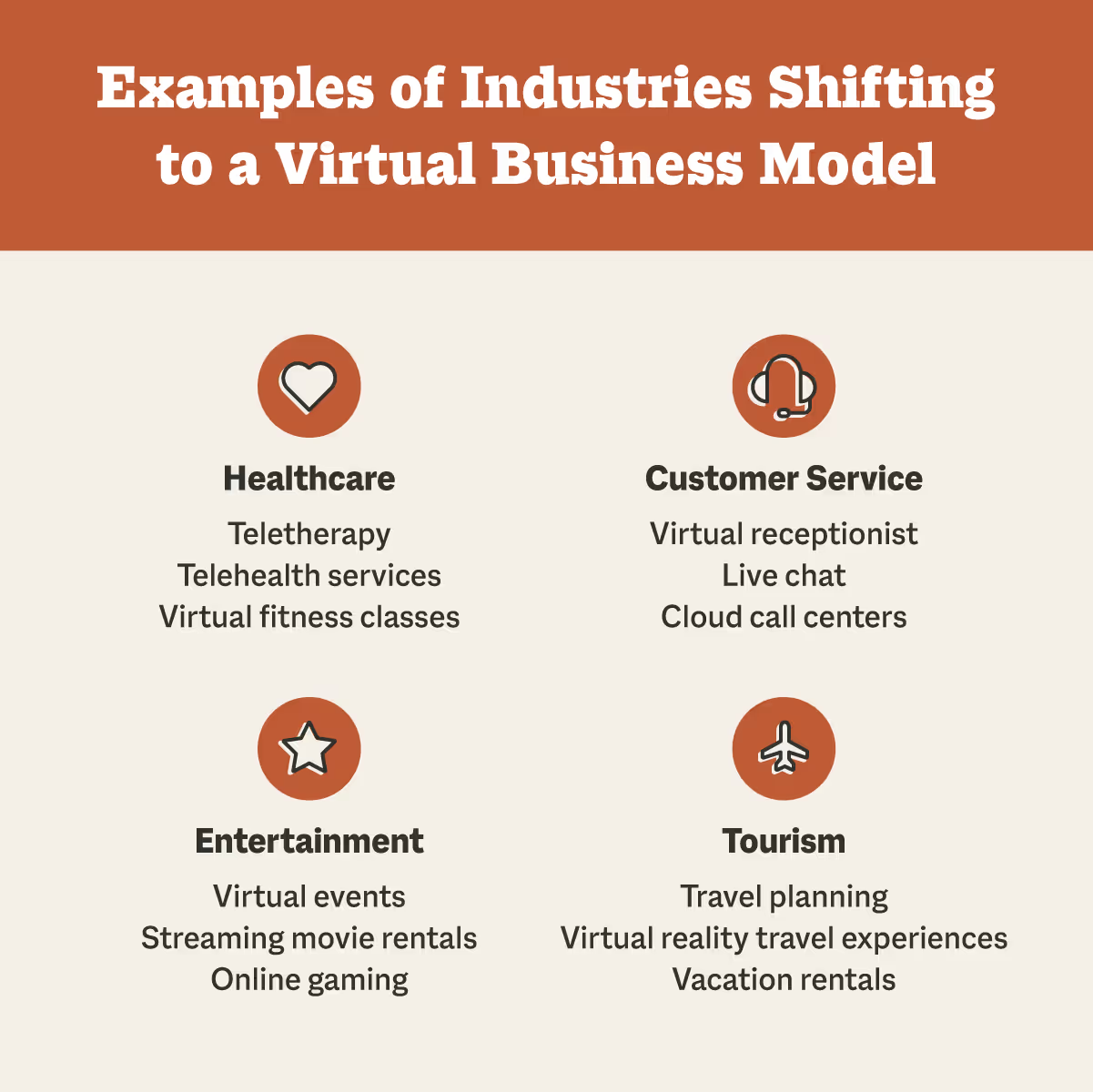Virtual Business: Definition and How It Works
Virtual Business: Definition and How It Works

A virtual business is one that performs all or most of its operations over the internet. With the rise of the virtual workplace, virtual businesses are taking over and will be the new normal in the near future.
To put this in context, according to a LinkedIn report, experts estimate that by 2030, there will be roughly 80 million full-time remote employees across the U.S. and EU, a 300% rise since 2019.
While this doesn’t mean that every business will be virtual, it does mean that every job that can be done remotely and isn't service- or location-based will be. Companies must be able to adapt to an ever-changing world in order to remain successful.
Consider this: Firms that adopted technology 20 years ago mostly supplanted those that did not. Companies that embrace a virtual business early on have the ability to surpass competitors that don’t.
Keep reading to learn the fundamentals of a virtual business, the advantages and disadvantages, and examples of industries that are well-suited for going fully virtual.

What is a virtual business?
A virtual business is one that is run primarily online rather than a physical, or brick-and-mortar, office. While virtual business operations are mostly conducted online, they can differ in levels of physical operations.
Some virtual businesses are fully online, with no central office or headquarters and solely remote employees. In other instances, a virtual business may maintain a physical location for important meetings or a facility where employees can do tasks such as packing shipments for customers like Amazon.
Because of the minimal overhead costs, virtual businesses are popular among startups and small businesses that are run from home.
How does a virtual business work?
To run a virtual business, all you need is a computer and access to the internet. Thanks to the rise of technology trends like video conferencing and project management tools, running a virtual business has become more possible than ever before.
With everything running online, you no longer need to worry about geographic boundaries. This means you have the ability to hire employees from all over the world and expand your customer base from virtually anywhere.
To do this, a virtual business must employ high amounts of communication technology like cloud computing and phone answering to interact with employees and clients.

Pros and cons of virtual businesses
Just like any business model, there are always benefits and drawbacks. Check out some of the advantages and disadvantages of operating a virtual business.

Advantage: Save on expenses
One of the greatest advantages of a virtual business is the reduction of many business expenses. First and foremost, without the need of a physical office space, you can save on overhead costs like rent and utilities.
According to estimations by Global Workplace Analytics, employers can save roughly $11,000 per person per year if they enable their staff to work remotely 50% of the time.
Since most work can be done online, many virtual businesses take advantage of that by getting rid of unnecessary costs. This could include outsourcing various business functions such as sales, marketing, answering services, product development, and shipping.
Advantage: Flexible, more diverse employee base
A physical office limits you to hiring the best person you can afford within a 30-mile radius, thereby excluding 99.9% of the world's talent.
Since employees in a virtual business environment can work anywhere, employers have the luxury of hiring people from all over the world, helping to diversify their workforce. This means you can hire the most talented and qualified people for the job without any geographical boundaries.
Advantage: Happier and more productive workforce
Despite the common fear that remote work results in a less productive workforce, recent data proves otherwise. According to an Owl Labs survey, 90% of employees working remotely are just as productive (if not more) as those working in the office.
Employees also acquire a better overall work-life balance as a result of having more time for family, hobbies, and exercise, which is critical for employee happiness and long-term retention.
Disadvantages of operating a virtual business
While a virtual business proves to have many advantages, there are a few drawbacks that you should consider before establishing one. However, a majority of these issues have easy solutions that you should proactively implement to make sure your virtual business remains successful.
- Potential communication issues: Effective communication, both internally and externally, is key to making sure your business runs smoothly. Invest in the proper project management tools and communication platforms to keep your employees organized, and consider outsourcing your sales and answering services to make sure you don’t miss out on potential sales leads.
- Possible cybersecurity breaches: Cyber attacks put your business at risk of financial losses and brand damage when your personal information and that of your clients is compromised. Invest in password security apps and Virtual Private Networks (VPN) to ensure privacy and security of work completed remotely.
Virtual business examples by industry
The more work that is done on a computer, the easier it is for a business to become virtual. Virtual businesses can deliver both products and services, providing greater access to goods and expert service providers, no matter where the business operator works or their customers live.
While the shift to virtual has been one of the most prominent digital changes in the retail industry, many other businesses are following suit. Check out this list of virtual business examples that are taking over the internet.
Retail: E-commerce, drop-shipping (no onsite inventory)
Health care: Telehealth services, teletherapy, virtual fitness classes
Education: Online courses, virtual homeschool services, remote tutors
Customer service: Virtual receptionist, live chat, cloud call centers
Finance: Online banking, contactless payments
Entertainment: Virtual events, streaming movie rentals, online gaming
Tourism: Online travel planning, virtual reality (VR) travel experiences
Petcare: Dog walking apps, pet supplies delivery

Virtual companies have already proven to be a viable business model, and they will continue to do so in the years ahead. In order to be competitive and current in our ever-changing technological landscape, it's time to at least consider switching to a virtual business.
If you are planning on making the switch, consider hiring our 24/7 virtual receptionists who handle various tasks to help you and your employees as you transition to new workplace arrangements.
Sources: LinkedIn | Global Workplace Analytics | Owl Labs | Cision |
Take the faster path to growth. Get Smith.ai today.
Key Areas to Explore

Your submission has been received!














.svg)



